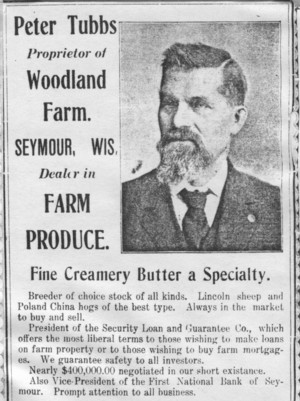Civil War Veterans in Seymour
 Civil War Veterans in Seymour
Civil War Veterans in Seymour
The census of 1890 indicates that over 40 Civil War veterans were living in the city and town of Seymour. Most of them arrived in the area during the decade following the war (1865-1875) when fertile land was available at between $2.00 and $4.00 an acre. Many of these men experienced intense fighting and witnessed the death of friends and relatives. It is the most deadly of all U. S. wars, at a cost of over 600,000 American lives. Wisconsin raised 91,200 soldiers for the War Between the States and about 12,000 of these men were killed in action or died from disease.
Memorial Day is a time to reflect on the price paid by many so our country’s democratic traditions may be passed on to future generations. It is the responsibility of each citizen to understand the commitment of others who have gone before them, and honor their memory through preserving the freedoms for which they fought. It was after the Civil War in 1868 when flowers were first placed on the graves of soldiers in Arlington Nation Cemetery.
Prominent Seymour resident, Peter Tubbs is an example of the path taken by many area veterans following the Civil War (1861-1865). Living in the Neosho area in Dodge County, at age 21 he enlisted in Company I, 29th Regiment at Hartford in August of 1862. After training at Camp Randall in Madison, he left Wisconsin in November 1862 for Helena, Arkansas. The 29th was known as a hard fighting organization and Tubbs engaged the enemy throughout Mississippi and Alabama. He was with Grant in the siege of Vicksburg and helped secure Fort Gaines during the fight for Mobile Bay.
Tubbs wrote numerous letters home to his sister, Jane. The letters have been preserved and are in the collection of the State Historical Society in Madison. His letter written after the surrender of Vicksburg portrays how common it was to lose friends, and the hardships experienced by the soldiers. He also refers to the conditions in Vicksburg, the declining value of confederate currency, and his eagerness to return home and eat northern food.
Letter from Peter S. Tubbs to his sister, Sarah Jane Merrell: Vicksburg, Miss., Saturday, July 25th, 1863
“...We have at last landed at Vicksburg safe and sound and are now enjoying the fruits of our labor. We have had a hard time, but we feel paid for our labor...We have not got over 25 men in this company fit for duty. The company looks like a small squad to what it did in Hartford when there was over one hundred and all well, but the dead are forgotten and one has to think twice to recall to memory the name of the deceased.
I suppose the north is all joy over the recent victories on all hands and I assure you there is a good feeling among the soldiers and they begin to think the days of the confederacy are numbered. The ways our generals are working now, I don’t think we need to be ashamed to pray for the success of our arms but heretofore I had little faith in praying for success when things were carried on against God and reason. If the war had been carried on with the same earnestness a year ago that it has for the last three months it would have been ended, but there is no use crying over spilt milk...
We had a rather hard march marching from Jackson here we made it in two days and a half but only about fifty in the regiment came through... I think we shall stay here for quite a spell. We have a very pleasant location on the riverbank about a mile below the city but in sight of it. We are going to draw new tents and I understand the Col. Said we should draw caps and new clothes and look respectable so I think by that we are going to stay here...
Vicksburg presents quite a lively appearance and is thronged with soldiers and pies and cakes are in great demand. I went up town yesterday and prospected the city until I was tired out... The hills are full of large caves that the women and children lived in when our fire was too hot for them.... I thought I would eat anything that looked like honey, but I can’t eat the honey here, instead of having a good taste it is fairly sickening... I would rather have one Irish potato than a bushel of sweet ones. The rebs confederate script has taken a fall since we came here. The rebs won’t take it themselves one greenback is worth a hundred in script...
There is a daguerreo office here and I guess Alfred and I will have our phiz taken and send them home. I expect we will get our mail regular now until we leave the river again. Write as often as convenient.”
Following his discharge Tubbs helped his father on the farm in Dodge County, got married, then in 1868 moved to the Seymour area. For $4.00 an acre, he purchased 80 acres of wooded, wild, and uncultivated land, two miles north of the present city of Seymour. At that time, the road to the Tubbs house was just a trail and there were only three houses in Seymour.
By the turn of the century Tubbs’ land, including that of his children, grew to 600 acres. His “Woodland Farm” gained a reputation for its quality produce, butter, and eggs. Peter Tubbs was Seymour’s first postmaster, helped organize the First National Bank, was president of the Seymour Fair and Driving Park Association, and was active in county politics. He and his wife (Phebe Armitage) had ten children. His grandson, Bill Tubbs, still resides on Tubbs Road north of Seymour.